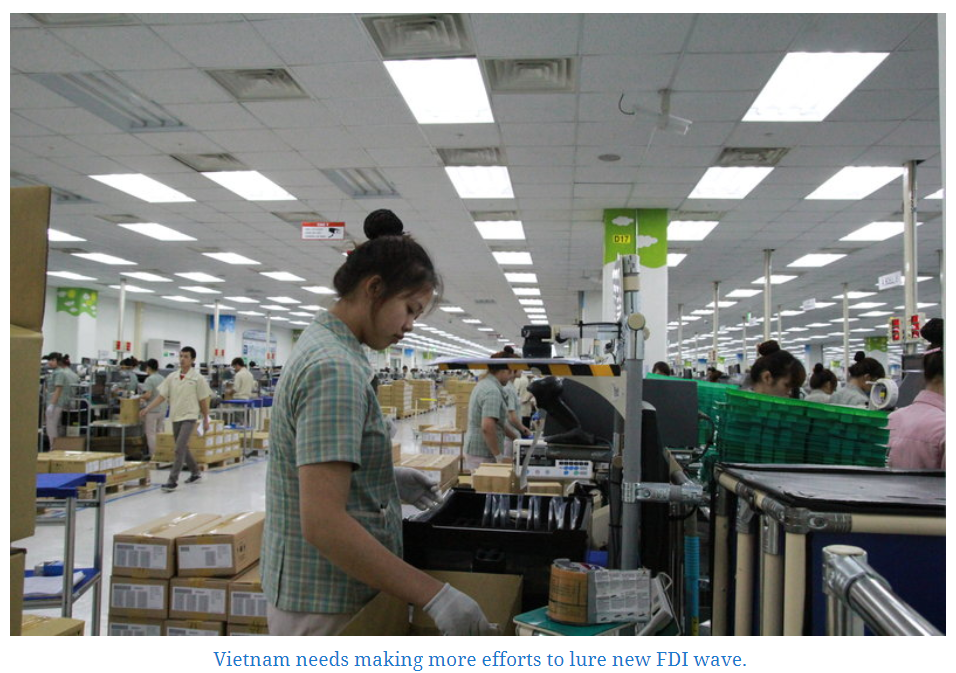Vietnam needs more efforts to lure new FDI wave
The Hanoitimes – While other countries are setting up specific and clear priorities to attract FDI projects, Vietnam is still pursuing a strategy with multiple targets that could lead to missed opportunities.
Vietnam is not the only magnet for a new wave of foreign direct investment (FDI), which came as a result of global companies diversifying their value chains in the post-Covid-19 period, according to economist Pham Chi Lan.
While other countries are setting up specific and clear priorities to attract FDI projects, Vietnam is still pursuing a strategy with multiple targets, Lan told Vnexpress, adding this could lead to missed opportunities.
For example, India is a prime target to receive new investment capital. According to Bloomberg, in April, the Indian government reached out to more than 1,000 companies in the US and through overseas missions, offered incentives for manufacturers seeking to move out of China.
India is prioritizing medical equipment suppliers, food processing units, textiles, leather and auto part makers among more than 550 products covered in the discussions.
Indian officials reportedly told companies that the country is more economical for them in terms of securing land and affordable skilled labor than the US or Japan, even if overall costs are still higher than China. They have also offered an assurance that India will consider specific requests on changes to labor laws, which have proved a major stumbling block for companies, and said the government is considering a request from e-commerce companies to postpone a tax on digital transactions introduced in this year’s budget.
Vietnam in the race for FDI
At the opening of the first biannual National Assembly session on May 20, Prime Minister Nguyen Xuan Phuc said the Covid-19 pandemic is opening up opportunities for Vietnam to attract foreign capital shifted from China.
Nikkei reported that Apple is planning to produce 30% of total classic AirPods, equivalent to three to four million units, in Vietnam after having started the process since March. The US-based tech giant has also been recruiting a series of senior positions in Hanoi and Ho Chi Minh City in production, quality control, sales or supply chain.
A report from brokerage firm VNDirect in April noted Google and Microsoft have shifted some of its production chains from China to Vietnam and Thailand. Google is expected to start selling its smartphones partially produced in Vietnam, the Pixel4A and Pixe5, and Microsoft to market its Surface laptop, in this quarter.
Most recently, Panasonic is set to shut down a large appliance factory in Thailand and consolidate production to a larger facility in Vietnam, according to Nikkei.
Similar report from brokerage firm SSI suggested multinationals, such as Pegatron, Amazon and Home Depot, have started recruiting and seeking to set up new supply chains, with Vietnam being among potential destinations.
A Savills Vietnam executive said in comparison to regional peers, Vietnam holds the advantage of being in close proximity with China, so investors do not need to give up China completely when seeking to diversify their investments.
Data from Colliers International revealed Vietnam remains an attractive option for foreign investors with land rental fees 45% – 50% lower than neighboring countries of Thailand, Malaysia and Indonesia.
Japan External Trade Organization (JETRO) in its 2019 report stated Vietnam’s labor cost is much lower than those in Thailand, Malaysia and Indonesia.
Staying selective in attracting FDI
Former director of the Foreign Investment Agency under the Ministry of Planning and Investment Phan Huu Thang said Vietnam’s early containment of the Covid-19 pandemic is a plus in the eyes of investors.
In the first place, Thang said, investors see the country’s safety and high-quality health treatment services for both foreign and local citizens. Secondly, they see golden opportunities in a country having maintained high economic growth over the past few years.
Thang added the combined foreign investment capital globally has reduced from US$1.3 trillion to US$1 trillion, causing fierce competition among countries in the region.
Thang said it is vital for Vietnam to have a clear path from strategies to action plans, so that the country could stay in the race for new FDI.
The second issue lies in the readiness of domestic supply chains, Thang suggested, adding the lack of development of the supporting industries could restrict potential FDI.
In this regard, Economist Pham Chi Lan said Vietnam could not be seen as an attractive option if investors have to bring in its entire production chains.
While putting up efforts to attract new foreign-invested projects, Nguyen Thu Trang, director of the WTO Center and Integration under the Vietnam Chamber of Commerce and Industry (VCCI), said Vietnam should pay attention to the quality of the FDI and the risks of local enterprises being acquired at cheap prices.
On May 22, PM Phuc agreed to set up a task force that will help the country prepare for new FDI inflows in the post-Covid-19 period.
For the time being, Vietnam would give priority to addressing bottlenecks in the country’s investment environment, including the infrastructure network and quality of human resources, the prime minister said.
Source: http://hanoitimes.vn/vietnam-needs-more-efforts-to-lure-new-fdi-wave-312181.html


 Thailand
Thailand




